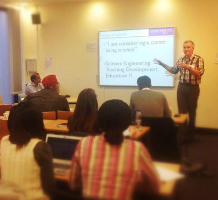 Following the success of the UoM Interdisciplinary symposium in January 2014, a team of doctoral researchers from all three universities in the NWDTC partnership (Liverpool, Manchester and Lancaster) have developed a seminar series that builds on the lessons learned in that symposium. The first day, held in Manchester in November 2014, brought together a number of experienced academics to talk about their experiences of researching interdisciplinarily.
Following the success of the UoM Interdisciplinary symposium in January 2014, a team of doctoral researchers from all three universities in the NWDTC partnership (Liverpool, Manchester and Lancaster) have developed a seminar series that builds on the lessons learned in that symposium. The first day, held in Manchester in November 2014, brought together a number of experienced academics to talk about their experiences of researching interdisciplinarily.
Prof. Jackie Stacey kicked off the day by emphasising how we must not try to wall paper over the cracks in our use of theory or method when borrowing from another discipline. Instead we should emphasise the existence of the cracks and use them to shed light on the applicability of the theory/method. After all in explaining how it doesn’t fit we can get exciting insights into the data.
The day was structured in such a way as to provide information on how established researchers from a variety of disciplines have developed the use of methods or theories from other disciplines in their own work, with a practical application of research from the charity sector. Panel presentations were given by:
Eleanor Harrison (CEO of Global Giving UK) gave a talk about the use of narrative data by the Global Giving storytelling tool; Dr Andy Howes (UoM) outlined the versatility of using photographic methods in research and the many different ways we can use images with our participants to draw out rich data; Prof. Simon Maxell (UoLiv) talked about the Liverpool Big Data Network; Prof Julian Williams (UoM) discussed the interface of often distinct theories, such as Vygotsky’s theoretical ideas and those of Bourdieu; Prof Rachel Calam (UoM) talked about engaging computer methods in research with young children; and Steven Courtney (UoM) talked about conceptualising Leadership in education.
At the end of the day Prof. Nick Crossley outlined how his work on social networks has brought him into collaboration with physicists, mathematicians, political scientists, ethnomusicologists, biologists and cultural analysts. This talk linked Day one with Day two, which will focus on researchers who straddle disciplines and interdisciplinary research teams.
The day was a resounding success and the doctoral researchers attending took away a few gems of wisdom. We asked the speakers to reflect on the challenges and positives they had faced when working interdisciplinarily. The talks provided useful information on a number of real world applications of interdisciplinary research and how an interdisciplinary approach can be useful to develop an holistic picture of a situation, or a different way of approaching a problem. However, while many of the speakers could see the benefits a few also spoke of the issues that arise when applying for posts within universities as jobs tend to be discipline specific and require a specific type of researcher.
Day one gave a useful insight into interdisciplinary research (Marc Hudson, a participant from Manchester, has reviewed the day on his blog in the Event Report: Enhancing Disciplinarity).
Day two will expand on the presentations from day one, from the viewpoints of other academic disciplines. It will also provide a more interactive forum for the delegates to get involved in.
Day two of the seminar series is on January 30 in Liverpool. Find out more at the Enhancing Disciplinarity blog.
